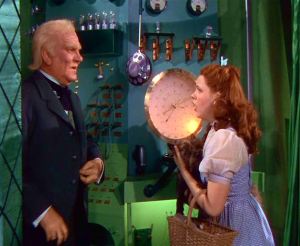 Quality of landlord is something that many office tenants take for granted. Landlords are typically some unknown person who the leasing agent reports to. If this guy owns this nice big office building, he should be fine, right – WRONG! Dorothy was afraid of the All-Powerful Oz until she realized it was just a little old, harmless man behind a curtain with no power.
Quality of landlord is something that many office tenants take for granted. Landlords are typically some unknown person who the leasing agent reports to. If this guy owns this nice big office building, he should be fine, right – WRONG! Dorothy was afraid of the All-Powerful Oz until she realized it was just a little old, harmless man behind a curtain with no power.
Why should tenants worry about who their landlord is? Because you want a landlord with a deep pockets and the willingness to spend it when necessary – that’s called power. An extreme example for Miami is hurricanes. If a hurricane hits an institutional landlord’s property, the institutional landlord is ready. It has resources outside of the state for supplies. Typically an institutional landlord uses a larger property management company and together they leverage their clout for repairs both in materials and contractors. They get your office up and running as quickly as possible. This team has a written plan that is reviewed annually and provided to the tenants so everyone knows what to expect in a crisis.
Who is an institutional landlord? It’s an insurance company, a pension plan, an extremely large investment fund like a REIT. They have a substantial portfolio of millions of square feet of commercial real estate.
What if your building is owned by someone who lives in South America or Europe and visits the building once a year, if that, and leaves all the decisions to a local family member? In my hurricane example, how will your building be secured and repaired? Do they have the money to front the repairs while waiting for the insurance adjusters? Can they cover their insurance deductible? Is the earnest family member able to focus on repairing your office or are they focused on their home? Many private foreign investors are not a problem, but hard questions need to be asked before you sign a lease.
What if your building was purchased by private investors in 2006 or 2007? They paid at the height of the market and many of those buyers of smaller buildings were condo-converters who REALLY over-paid. Now the property is worth less than the mortgage. It could be either in foreclosure or the pre-foreclosure stages. What happens after a hurricane? Routine maintenance has fallen by the wayside. Where’s the money to repair your office? They don’t have it, do you?
Hurricanes are extreme but real examples. These same issues of deep pockets apply to keeping up on routine maintenance, paying for the construction of your new office, replacing big ticket items like the roof or air-conditioning, repairing the elevators (that costs a fortune). You want a landlord who planned for these things and takes care of them quickly.
Landlords want tenants to be quiet and happy. Quiet, happy tenants pay rent on time and typically renew their leases. There are many private investors who are savvy real estate professionals and have the resources to maintain and repair their buildings, but you need know who you are dealing with.
Now here’s another important point about institutional landlords – they negotiate leases each and every day. Real estate is their business. One of my benefits to my clients is that I will know your landlord. I strongly urge you to have a seasoned professional in your corner to level the playing field for you. That professional would be me – call me for a free lease analysis and I can tell some war stories of why a good landlord is worth the money. Just remember Dorothy and her man behind the curtain. He never got her home — even after he promised.


1 Comment
Your entries are always insightful and memorable. As a person in the real estate industry, it’s refreshing to see someone give so much of themselves to inform others. Thank you!